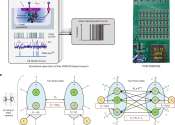An approach to realize Potts annealing using single-photon avalanche diodes
Massively parallel annealing processors, where the computing nodes on a single processor can simultaneously perform a series of coordinated operations, could have a huge potential for tackling complex sampling and optimization ...









